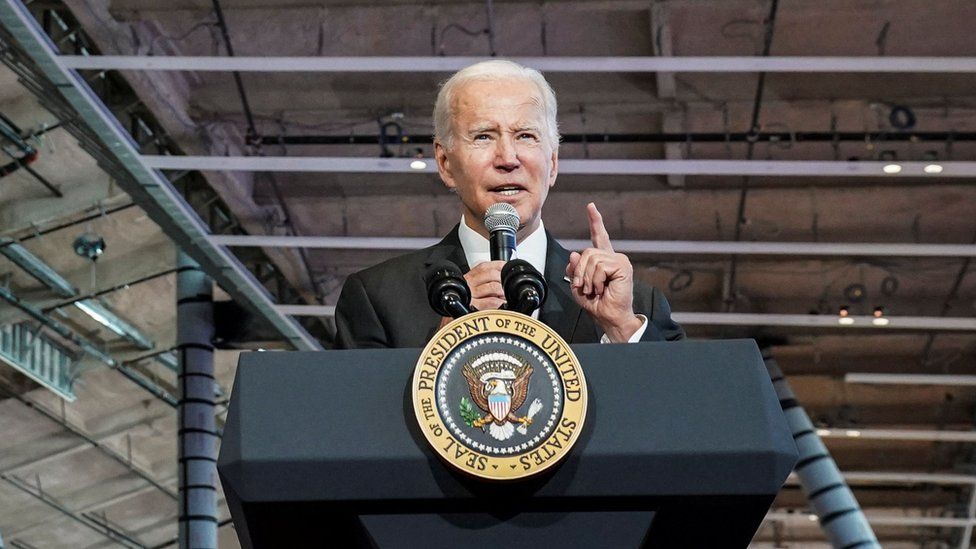
US inflation remains high despite lower petrol prices
 Image source, Reuters
Image source, Reuters
Joe Biden has called bringing down inflation his top priority
Fast rising prices continued to trouble the US economy last month, despite some relief from a fall in petrol costs.
The annual inflation rate, the pace at which prices rise, slipped to 8.3% in August, the Labor Department said.
That was down from 8.5% in July, marking a second month of decline.
But the costs of food, housing and medical care continued to surge, disappointing economists hoping for more widespread easing and sparking a sell-off on Wall Street.
The Dow Jones Industrial Average and the S&P 500 sank more than 3%, while the Nasdaq fell more than 4%.
The report also renewed pressure on US President Joe Biden, whose approval ratings fell below 40% earlier this year, reflecting concerns about the rising cost of living.
While his ratings have recovered slightly in recent weeks as petrol prices have subsided, the issue remains “a huge problem” for the president and for the Democratic party more broadly, said pollster Chris Jackson.
“Americans have been telling us for months now that it’s the number one concern they have and rightly or wrongly they blame whoever’s running the country for that,” said Mr Jackson, senior vice president at the Ipsos polling firm.
The next round of national elections is scheduled for November, a contest that will determine whether Mr Biden’s Democrats maintain their slim control of Congress.
For a president with approval ratings like Mr Biden’s to see his party pick up seats in the mid-terms would be unprecedented, Mr Jackson said.
Kenny Shorne is among the many Americans to have been affected by inflation, which peaked at 9.1% in June, the fastest pace since the early 1980s.
The 23-year-old, who supports himself with construction and photography jobs, lives in New Jersey with his family to try to keep expenses down. He also recently took a break from his master’s degree programme in communications, concerned about being able to afford it as other costs climb.
Kenny Shorne aid high petrol prices were among the items presenting a problem.
He said high petrol prices were among the items presenting a problem, despite the fact that they have come down in recent weeks.
“Inflation makes it hard for me to see a liveable future,” he said. “It really gets to me because I don’t know what the answer is.”
The cost of groceries in the US jumped 13.5% in the 12 months to August, while housing costs climbed 6.2% and medical care rose 5.6%.
Energy costs – one of the big drivers of inflation – also remain far higher than a year ago, but they have dropped sharply in the past two months, falling more than 10% from July to August, the Labor Department said.
Overall the consumer price index, which tracks goods and services across the economy, was up 0.1% from July to August, as the fall in petrol costs was offset by increases in other areas.
Some breathing room?
While economists remain concerned as prices outside of energy continue to rise, the annual number typically matters most in terms of shaping people’s perceptions, said Betsey Stevenson, professor of economics and public policy at the University of Michigan, who served in the White House under former president Barack Obama.
“It’s really good news that gas prices are coming down. it gives people a little bit more room in their budget, a little bit more breathing room and I think it also makes people feel a little bit better,” she said.
But she added: “I don’t think it speaks to being out of the woods”. She expects inflation to remain higher than the US central bank’s 2% inflation target even at the end of next year.
Like central banks in other countries, including the UK, policymakers at the Federal Reserve have been raising interest rates since March to tackle the problem.
By making borrowing more expensive, the hikes are intended to cool demand from households and businesses, helping to reduce some of the pressures pushing up prices.
The Fed is widely expected to announce another large increase this month, a move analysts said was all but confirmed by latest report.
“Investors should brace themselves for even higher rates than they anticipated before today’s release,” said Ronald Temple, managing director, co-head of multi-asset and head of US equity at Lazard Asset Management.
“Despite the sharpest tightening of monetary policy in decades, the Fed still has more heavy lifting ahead.”
Source: https://www.bbc.co.uk/news/business-62884288?at_medium=RSS&at_campaign=KARANGA















